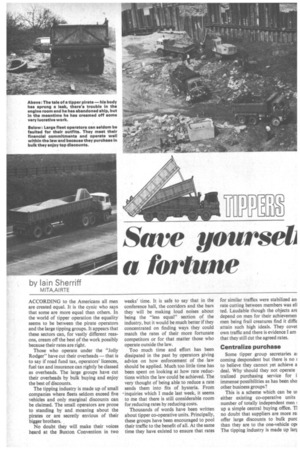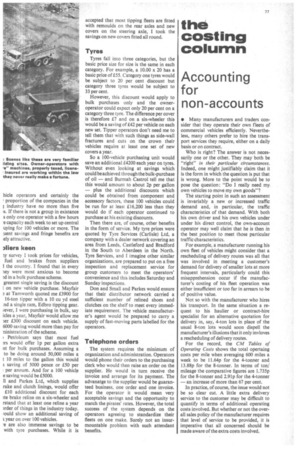Save yoursel) a fortune
Page 78

Page 79

If you've noticed an error in this article please click here to report it so we can fix it.
by lain Sherriff
MITA,AIRTE ACCORDING to the Americans all men are created equal. It is the cynic who says that some are more equal than others. In the world of tipper operation the equality seems to be between the pirate operators and the large tipping groups. It appears that these sectors can, for vastly different reasons, cream off the best of the work possibly because their rates are right.
Those who operate under the "Jolly Rodger" have cut their overheads — that is to say if road fund tax, operators' licences, fuel tax and insurance can rightly be classed as overheads. The large groups have cut their overheads by bulk buying and enjoy the best of discounts.
The tipping industry is made up of small companies where fleets seldom exceed five vehicles and only marginal discounts can be claimed. The small operators are prone to standing by and moaning about the pirates or are secretly envious of their bigger brothers.
No doubt they will make their voices heard at the Buxton Convention in two weeks' time. It is safe to say that in the conference hall, the corridors and the bars they will be making loud noises about being the "less equal" section of the industry, but it would be much better if they concentrated on finding ways they could match the rates of their more fortunate competitors or for that matter those who operate outside the law.
Too much time and effort has been dissipated in the past by operators giving advice on how enforcement of the law should be applied. Much too little time has been spent on looking at how rate reductions within the law could be achieved. The very thought of being able to reduce a rate sends them into fits of hysteria. From
• inquiries which I made last week, it seems to me that there is still considerable room for reducing rates by reducing costs. Thousands of words have been written about tipper co-operative units. Principally, these groups have been encouraged to pool their traffic to the benefit of all. At the same time they have existed to ensure that rates for similar traffics were stabilized an rate cutting between members was eli ted. Laudable though the objects are depend on men for their achievemen. men being frail creatures find it diffic attain such high ideals. They covet own traffic and there is evidence T am that they still cut the agreed rates.
Centralize purchase
Some tipper group secretaries ai coming despondent but there is no i to believe they cannot yet achieve a deal. Why should they not operate tralized purchasing service for i immense possibilities as has been sho other business groups?
This is a scheme which can be tu. either existing co-operative units number of totally independent men up a simple central buying office. TI no doubt that suppliers are more re; offer large discounts to bulk purc than they are to the one-vehicle opg The tipping industry is made up lark hick operators and certainly the proportion of the companies in the ; industry have no more than five a. If there is not a group in existance s only one operator with a few hours e capacity each week to set up central uying for 100 vehicles or more. The pent savings and fringe benefits are tely attractive.
pliers keen
ly survey I took prices for vehicles, fuel and brakes from suppliers the country. I found that in every hey were most anxious to become !d in a bulk purchase scheme.
greatest single saving is the discount on new vehicle purchase. Mayfair e at Tamworth quoted me £3900 for 16-ton tipper with a 10 cu yd steel .nd a single ram, Edbro tipping gear. mver, I were purchasing in bulk, say ides a year, Mayfair would allow me ler £300 discount on each vehicle. 6000 saving would more than pay for ninistrat ion of the scheme.
Petroleum says that most fuel irs would offer lp per gallon extra nt for bulk purchases. Assuming a to be doing around 50,000 miles a t 10 miles to the gallon this would 3. saving of 5000 pence or £50 per per annum. And for a 100 vehicle e saving would be £5000.
11 and Parkes Ltd, which supplies rake and clutch linings, would offer £10 additional discount for each !te brake reline on a six-wheeler and rstand that at least one reline a year n:der of things in the industry today. Tould show an additional saving of year on over 100 vehicles, :e are also immense savings to be with tyre purchases. While it is accepted that most tipping fleets are fitted with remoulds on the rear axles and new covers on the steering axle, I took the savings on new covers fitted all round.
Tyres
Tyres fall into three categories, but the basic price size for size is the same in each category. For example, a 10.00 x 20 has a basic price of £55. Category one tyres would be subject to 20 per cent discount but category three tyres would be subject to 33 per cent.
However, this discount would apply to bulk purchases only and the owneroperator could expect only 20 per cent on a category three tyre. The difference per cover is therefore £7 and on a six-wheeler this would be a saving of £42 per vehicle on each new set. Tipper operators don't need me to tell them that with such things as side-wall fractures and cuts on the crown their vehicles require at least one set of new covers a year.
So a 100-vehicle purchasing unit would save an additional £4200 each year on tyres. Without even looking at savings which could be achieved through the bulk-purchase of oil — and Burmah Castrol tell me that this would amount to about 2p per gallon — plus the additional discounts which could be obtained from component and accessory factors, these 100 vehicles could be run for at least £16,200 less than they would do if each operator continued to purchase at his existing discounts.
Then there are, of course, other benefits in the form of service. My tyre prices were quoted by Tyre Services (Carlisle) Ltd, a company with a dealer network covering an area from Leeds, Castleford and Bradford in the South to Aberdeen in the North. Tyre Services, and I imagine other similar organizations, are prepared to put on a free inspection and replacement service for group customers to meet the operators' convenience and this includes Saturday and Sunday inspections.
Don and Small and Parkes would ensure that their distributor network carried a sufficient number of relined shoes and clutches on the shelf to meet every immediate requirement. The vehicle manufacturer's agent would be prepared to carry a supply of fast-moving parts labelled for the operators.
Telephone orders
The system requires the minimum of organization and administration. Operators would phone their orders to the purchasing clerk who would then raise an order on the supplier. He would in turn receive the invoice and arrange for its payment. The advanatge to the supplier would be guaranteed business, one order and one invoice. For the operator it would mean very acceptable savings and the opportunity to match the pirates' rates. However, the total success of the system depends on the operators agreeing to standardize their fleets on one make, Surely not an insurmountable problem with such attendant benefits.




















































































































































